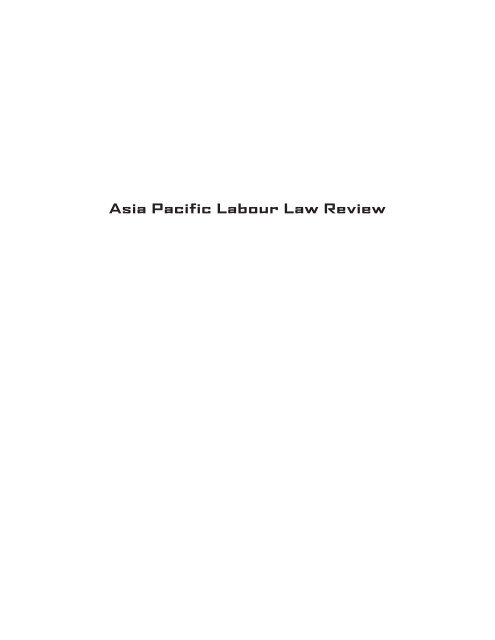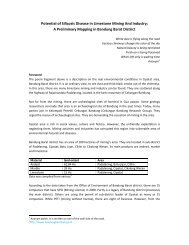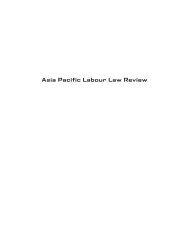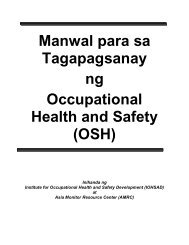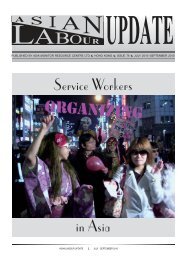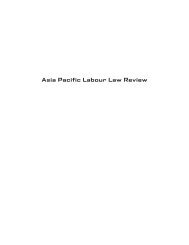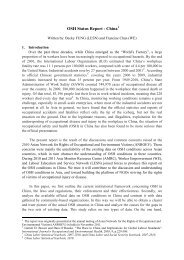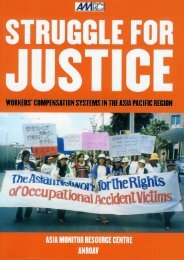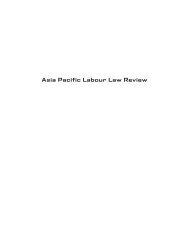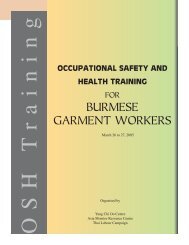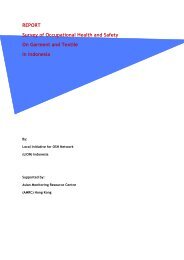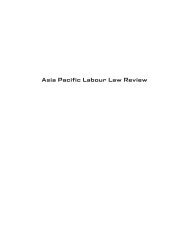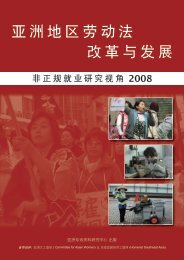Sri Lanka - Asia Monitor Resource Center
Sri Lanka - Asia Monitor Resource Center
Sri Lanka - Asia Monitor Resource Center
You also want an ePaper? Increase the reach of your titles
YUMPU automatically turns print PDFs into web optimized ePapers that Google loves.
<strong>Asia</strong> Pacific Labour Law Review
<strong>Asia</strong> Pacific Labour Law ReviewWorkers’ Rightsfor the New Century<strong>Asia</strong> <strong>Monitor</strong> <strong>Resource</strong> Centre2003
<strong>Asia</strong> <strong>Monitor</strong> <strong>Resource</strong> Centre Ltd.AMRC is an independent non-governmental organisationthat focuses on <strong>Asia</strong>n and Pacific labour concerns.The <strong>Center</strong> provides information, research, publishing, training, labour networkingand related services to trade unions, pro-labour groups, and other development NGOs.AMRC’s main goal is to support democratic and independent labour movements in <strong>Asia</strong> and the Pacific.In order to achieve this goal, AMRC upholds the principlesof workers’ empowerment and gender consciousness, and follows a participatory framework.Published by<strong>Asia</strong> <strong>Monitor</strong> <strong>Resource</strong> Centre Ltd (AMRC), 444 Nathan Road, 8-B, Kowloon, Hong Kong, China SARTel: (852) 2332 1346 Fax: (852) 2385 5319 E-mail: admin@amrc.org.hk URL: www.amrc.org.hkCopyright © <strong>Asia</strong> <strong>Monitor</strong> <strong>Resource</strong> Centre Ltd, 2003ISBN 962-7145-18-1All rights reserved. No part of this publication may be reproduced, stored in a retrieval system, or transmittedin any form without prior written permission.Editorial TeamStephen Frost, Omana George, and Ed ShepherdLayoutTom FentonCover DesignEugene KuoAcknowledgementsAMRC expresses sincere thanks to the following people and organisations for their gratefully receivedcontributions to this book.Suchada Boonchoo (Pun) is co-ordinator for the <strong>Asia</strong>n Network for the Rights of Occupational AccidentVictims. We thank her for all the help in organising our conference of authors in Bangkok.Thanks to the American <strong>Center</strong> for International Labor Solidarity, Bangkok, Thailand for a financial contributiontowards printing the book.We are indebted to Oxfam Hong Kong for their financial contribution towards the production costs.Thanks to the International Labour Organisation for allowing us to use photographs from their library freeof charge.Eugene Kuo, a freelance photographer and designer, a big thank you for contributing photographs and designingthe cover free of charge. Look at www.226-design.com for some of Eugene’s stunning work andideas.To Tom Fenton, co-founder (with Mary Heffron) of AMRC – thanks a lot for advice, maps, and all the timedevoted to the layout of the book, free of charge. E-mail: tfenton@igc.org.Finally, we would like to thank the International Centre for Human Rights and Democratic Development,Canada, for an extremely generous contribution that covered much of the publishing costs of this book.Without their last-minute financial assistance, it is possible that this book would never have proceeded beyondthe editing stage. E-mail: ichrdd@ichrdd.ca; URL: www.ichrdd.ca.<strong>Asia</strong> <strong>Monitor</strong> <strong>Resource</strong> Centre
<strong>Sri</strong> <strong>Lanka</strong>Anton Marcus and Melanie Brehaut, compilersHistory of labour lawThe labour laws of <strong>Sri</strong> <strong>Lanka</strong> are considered to be some of the most liberal when compared with other South<strong>Asia</strong>n countries. Nevertheless labour law is complex, drawing its influence from the British. Colonial influencesare also found in <strong>Sri</strong> <strong>Lanka</strong>’s common and criminal law, which is derived from the Dutch; some laws are shapedaround the Indian legal system. Labour laws cover issues including social pensions, retirement funds, overtime,minimum wages and hours, sick leave, termination, unfair dismissal, workers compensation, workplace safety,industrial disputes, arbitration, and trade union rights.For the most part labour laws are applicable only in the private sector.The public sector is governed by the Establishments Code.These laws have long been under threat from employers pressuring the government to amend legislation tosuit their needs. This threat is further compounded by the fact that labour law is not implemented in the first place.1
South <strong>Asia</strong>2The liberal nature of labour law is due in part to thestrong agitation by the working class in the 1920s in lobbyinggovernment for changes to legislation. 1 DuringBritish times the left movement started a campaignagainst colonial regimes, developing trade unions tofight the cause. After independence in 1948, the left partiesjoined the Parliament. By forming a coalition withMrs <strong>Sri</strong>mavo Bandaranaike’s government in 1964 theygave up class politics and became more reformist. Thiswas a turning point for the working class movement; abetrayal. From this time onwards the left parties tookpart in class collaboration politics, rather than classstruggle politics.The opening up of the economy and the rapid movestowards globalising the economy have been felt in <strong>Sri</strong><strong>Lanka</strong>’s political economy, which has in turn had an impacton labour relations, and a breakdown of democracy.In 1977 the newly elected United National Party(UNP) government, which ousted Mrs Bandaranaike’sparty, unlocked the doors for foreign investment, changingto an ‘export-orientated economy’, under WorldBank and International Monetary Fund (IMF) ‘structuraladjustment policies’, when free trade zones (FTZ)were established. At the same time, the governmentchanged the constitution to introduce the executive presidencysystem. The free rice rationale enjoyed by the peoplefor more than 50 years was lost and the cost of livingwent up rapidly. When 14 unions went on strike in 1980demanding Rs10 per month wage increase, the governmentdeclared all industries as essential services andcalled for emergency regulations to be implemented. Underthe emergency 75,000 workers were dismissed, weakeningthe trade union movement and the opposition.After 25 years of globalisation and so-called economicdevelopment, in July 2002 Prime Minister RanilWickramasinghe made a statement saying the governmentis operating with money that is 98 percent of EmployeesProvident Fund (EPF) contributions. Hisstatement clearly shows the government’s failure. Yet, inspite of this the government continues with economicliberalisation policies ordered by the IMF and WorldBank.The <strong>Sri</strong> <strong>Lanka</strong>n government has ratified 39 InternationalLabour Organisation (ILO) conventionsincluding:• Convention No. 29 on Forced Labour;May Day 2002.Postal Workers Union members worked to rule for five days in2001 (Credit: Kelly Dent, TIE-<strong>Asia</strong>)• Convention No. 87 on Freedom of Association andProtection of the Right to Organise;• Convention No. 98 on the Right to Organise andCollective Bargaining;• Convention No. 100 on Equal Remuneration;• Convention No. 111 on Discrimination (Employmentand Occupation);• Convention No. 103 on Maternity Protection;Though <strong>Sri</strong> <strong>Lanka</strong> is a signatory to these conventionsit means little for workers as the conventions are not implementedor effectively monitored.Major labour laws in <strong>Sri</strong> <strong>Lanka</strong>Legislation/laws designed to provideor protect workers’ welfarei) Employees Provident Fund Act No. 15 1958 plusamendments; lump sum payment upon retirement, formen 55 years, women 50 years or when they marry. EPFcontributions come from the employer (12 percent) andthe worker (eight percent).ii) Payment of Gratuities Act No. 12 1983 plus amendments:applicable to workplaces with more than 15 employeesand have worked for more than five years. Uponresignation or termination, workers are entitled to half amonth’s salary for each year of service.iii) Employees Trust Fund (ETF) Act No. 46 1980 plusamendments: at workplaces with more than 15 employees,the employer must contribute 3 percent of theworker’s earned salary to the ETF. Employees maywithdraw from this fund after five years.<strong>Asia</strong> <strong>Monitor</strong> <strong>Resource</strong> Centre
SRI LANKAiv) Workers in the public sector are included in a pensionscheme: minimum 10 years service to be eligible forpension at retirement (men – 55 years, or extension up to60; women – 50 years). Salary contributions betweenfour and seven percent are made to the Widows and OrphansFund Scheme.v) Wages Board Ordinance 47 1988 plus amendments:legislation covers working hours, minimum wage, overtime,holidays, and paid leave etc. Wages boards existfor 39 industries under the Ordinance. Industries notcovered are provided for in Part 1, a general section ofthe Ordinance.vi) All matters relating to the above (v) for the publicsector fall under the Establishments Code.vii) Shop and Office Employees Act No. 19 1954: regulationof employment and remuneration for shop and officeemployees.viii) Termination of Employment of Workmen Act No.45 of 1971: safeguards against unfair dismissal, exceptfor disciplinary grounds. Employers retrenching or terminatingworkers must gain workers’ consent or permissionfrom the Labour Commissioner.Collective labour rightsi) Trade Union representatives (Entry into estates) ActNo. 25 1970: allowing trade union representatives intoplantation sector.ii) Employees Councils Act No.32 of 1979 plus amendments:participation of employees’ representatives inplanning process of public enterprise.iii) Industrial Disputes Act No.43 of 1950 plus amendments:the Commissioner of Labour, appointed by theLabour Minister, has power to intervene in an industrialdispute. The role of the Labour Commissioner is to tryand resolve disputes by conciliation with all parties. If itcannot be resolved, the Commissioner has the power torefer the matters in dispute to the Labour Minister for eithervoluntary or compulsory arbitration. The Ministerdecides if the matters in dispute will proceed. If so theMinister appoints an arbitrator from a panel of the IndustrialCourts. Under voluntary arbitration both partiesmust accept the ruling of the arbitrator. Compulsory arbitrationboth parties can challenge the findings throughan appeal process.Once a dispute has gone to arbitration it is illegal forworkers to continue to strike. Likewise it is illegal for anemployer to refuse to provide workers with employmentif the strike has been called off.The Commissioner may also call a referendum in adispute, which is conducted by secret ballot.The right to collective bargaining exists, even if aworker is not part of a union.iv) Public sector worker grievances not resolved throughthe head of department are referred to the Public ServiceCommission (PSC). If the workers are not satisfied theycan take the case up with the Cabinet of Ministers.Trade union rightsi) Trade Union Ordinance No. 3 1946 plus amendments:minimum of seven workers to form and register a union.To register, a union must: have a constitution formulatedaccording to Labour Department guidelines; hold ameeting and elect office bearers; submit forms to the LabourDepartment; submit its returns each year and informthe Labour Department of any changes in officebearers.Until December 1999 there was no legal requirementto recognise unions, or unions as collective bargainingagents. An amendment to the Act was made at this timestating that unions must be recognised as a bargainingagent in a workplace if 40 percent or more workers belongto a union.The right to strike is legal, but not a fundamentalright.ii) Unions are recognised under the EstablishmentsCode for the public sector, and also by the Labour Commissionerunder the Trade Union Ordinance.Public sector workers cannot join a private sectorunion.Federation union officials can apply for release forfull time union work, and return to their post oncefinished.Occupational health and safetylegislation/lawi) Factories Ordinance - No.45 of 1942 plus amendments:Labour Department factory inspectors are employedto check employers are complying withworkplace safety regulations. The department can prosecuteif regulations are violated.ii) Workmen’s Compensation Ordinance – No. 19 of1934 plus amendments<strong>Asia</strong> Pacific Labour Law Review 3
South <strong>Asia</strong>Worker’s compensation exists for accident or injury.For permanent injuries there is a formula to determinehow much compensation should be paid.If employees are not permanently injured, but requireleave for more than three days they receive paid leaveand medical expenses.iii) Public sector workers can get accident leave on fullpay for six months, followed by a further six months onhalf pay.Gender-related labour lawi) Maternity Benefits Ordinance No. 32 1939 plusamendments: women are granted 12 weeks maternityleave (including weekends) for their first and secondchild; six weeks thereafter. Maternity pay is at 6/7 ofnormal salary. Women working under the Shops and OfficesAct receive three months leave, excluding weekends– i.e. 90 working days.ii) Women in the public sector must serve a minimum ofnine months to be eligible for 84 working days maternityleave at full salary, additional to owed holidays etc.iii) Employment of Women, Young Persons andChildren’s Act No. 47 1956: there are limits on overtimehours for young people; some sectors prohibit employmentof young people. A ‘young person’ is between 16-18 years.The minimum age for employment of workers is 16 years.iv) Employment of Women at Night Act No. 32 1984:legislation for night work: women cannot be employedafter 10 p.m. without their consent. The employer is requiredto obtain prior permission from the Labour Commissioner.Women should only work overtime 10 daysper month, and they should not have already worked theday shift. Employers are required to provide womenwith an evening meal, and they should be paid 1.5 timesthe usual rate of salary.v) There is no menstruation leave.There is no policy for discriminationThere is no paternity leave, though the government isconsidering it.Legislation aimed at dealingwith discriminationThe Constitution of <strong>Sri</strong> <strong>Lanka</strong> refers to discrimination:Article 12 (2): no citizen shall be discriminatedagainst on the grounds of race, religion, language, caste,sex, political opinion, or place of birth.Article 12 (4): nothing in this Article shall preventspecial provision being made, by law, subordinate legislationor executive action, for the advancement ofwomen, children, or disabled persons.Key trade union federationsFew new trade unions have formed in the last two years.The atmosphere throughout the country is distinctlyanti-union. Government policy is to discourage unionsand encourage investment.One exception was the formation in January 2000 ofthe FTZ Workers Union (FTZWU). Restrictions placedon workers to prevent them from organising in factorieshas led to creative forms of organising in boarding housesand elsewhere within the FTZs. This new, democratic, independenttrade union has been formally recognised at thenational level. The union, the first of its kind in the FTZs,has a majority of women on the Executive Committee andas members. While this has been a positive step, branch unionsof the FTZWU have not been recognised.During its struggle the FTZWU witnessed: Board ofInvestment (BOI) intimidation of workers, harassmentof workers by management; the loss of 1,500 jobs; policeharassment and assault; threats from local politicians;threats from factory personnel; and 10 womenunionists arrested.The Progress Union has also been formed within theFTZs.See Appendix 2 for details of trade union federations.Case study: unfair dismissalThis case dragged on for more than four years. Theworker, Ms Karunawathi (Karuna) was first dismissedin 1997, and fought her case with the support of the JointAssociation of Workers and Workers’ Councils of theFTZ. (The Association was the precursor to the FTZWUformed in January 2000.)The Managing Director of Sky Sports <strong>Lanka</strong>, MrUlriche Kurrle, assaulted Karuna, a sewing machine operator,while at work in the factory in October 1997. SkySports <strong>Lanka</strong> is a German owned company operating inKatunayake, <strong>Sri</strong> <strong>Lanka</strong>’s largest FTZ. Many workerswitnessed the assault, which management claimed occurredbecause of an alleged mistake in production.4<strong>Asia</strong> <strong>Monitor</strong> <strong>Resource</strong> <strong>Center</strong>
SRI LANKAKaruna was dismissed without a domestic inquiry.While not a legal requirement, it is considered standardpractice in the private sector. Among the charges levelledat Karuna was her failure to report for work on theSaturday following the assault. She was seeking medicaltreatment for injuries sustained in the assault. Karunamade a complaint to the police, who referred the case tothe Mediation Board, a board appointed by the governmentfor resolving minor offences. At the same time,with the support of the Joint Association, Karuna filed acase with the Labour Tribunal.The Joint Association launched an international campaignto canvass support, which management claimedwas an attempt by the union to sabotage their operations.During Mediation Board proceedings the managing director’slawyer tried to get Karuna to sign a bogus apologyletter, which made false statements claiming theincident was her fault. She refused. Sky Sports managementfurther victimised Karuna by contacting other factories,discouraging them from employing her.Meanwhile the case before the Labour Tribunal didnot even reach the inquiry stage.Sky Sports management continually stalled proceedingsby not attending scheduled hearings. After morethan four years the case was abandoned in 2001 whenKaruna was forced to give up the fight and return to hervillage to care for her ill mother.Effectiveness of labour lawLabour laws in <strong>Sri</strong> <strong>Lanka</strong>, while relatively progressive,are not implemented. There are a myriad of issues contributingto the non-implementation of labour law in <strong>Sri</strong><strong>Lanka</strong>. Employers continue to hold the view that labourlaws are restrictive and act as a deterrent to investors.One important factor is the government’s lack of commitmentin upholding the law, and its focus on the civilwar. While a ceasefire agreement is in place at the timeof writing, the government has spent the last 19 years involvedin a civil conflict with the LTTE (Liberation Tigersfor Tamil Eelam) who are fighting for Tamil rightsand a separate state in the north and east of the country.The government’s priorities lie with the ‘war effort’ andlittle else.In <strong>Sri</strong> <strong>Lanka</strong> the Labour Department is responsiblefor the implementation of labour law. The head of thisdepartment is the Commissioner General of Labour,appointed by the Labour Minister. The principle of theLabour Department is to monitor employers, howeverthe department is grossly under resourced and unable tofulfil this duty. Corruption is also a contributing factor.The workforce continues to grow, yet the Labour Departmenthas not been upgraded by successivegovernments.With the election of a new government in December2001, the department has undergone a name change.Previously known as the Labour and VocationalTraining Department, it is now known as the Employmentand Labour Department. The emphasis has movedaway from labour, to employment. The practices of thedepartment have essentially remained the same. Thoughthe department has the power to take action, more oftenthan not it remains silent. Employers do not regard theLabour Department as an authoritative body. They knowthey can flout labour law with very little chance of punishment.Employees too are aware of this fact, however,often it is their only course for justice so they must persistwith the system despite its shortcomings. For example,cases before the Labour Tribunal takes anextraordinarily long time to be resolved, if at all. Someunresolved cases have been ongoing for more than 10years. This is due not only to a backlog in the system, butalso because of the time demands on lawyers appearingon behalf of employers.Lawyers juggle extreme caseloads across industrialand criminal sectors, therefore fixing a date to hear casesthat suits both parties is problematic. All available datesare engaged and the case is postponed time after time.However the union, or the worker is required to pay evenwhen the lawyer only appears to ask for an adjournment.It is a frustrating process for employees when they cannoteven have their cases heard.In cases where a resolution has been reached and theemployer must pay compensation, the situation is oftenno better than had it not been resolved at all. In many instancesthe Labour Commissioner will order an employerto pay compensation or to re-instate workers.Either way, employers will often ignore the order. As aresult workers may place an appeal with the tribunal andthe merry-go-round continues with the employer againavoiding punishment. As it is a long struggle to bring actionagainst employers, and the likelihood of compensa-<strong>Asia</strong> Pacific Labour Law Review 5
South <strong>Asia</strong>tion being paid minimal, many workers cannot afford tokeep following the case. Their primary concern is withseeking new employment to make ends meet. Unofficially,Labour Department officials say they do not wantto antagonise investors by implementing the laws.One example where the Labour Department relaxeslabour law is with regard to Employees Provident Fund(EPF) payments. The EPF Act requires that employersmake payments into the Central Bank of <strong>Sri</strong> <strong>Lanka</strong> everymonth. Despite it being illegal, the Labour Department allowsemployers to make deposits up to every six months.Employers collect the eight percent of workers’ salary tobe deposited, yet do not put it in the bank, also defaultingon the 12 percent contribution they must make. Often thismoney is used for other business purposes, and on someoccasions foreign investors may leave the country altogetherwithin this time frame without fulfilling their obligationsand statutory requirements.The unionisation rate is 12 percent including publicand plantation sectors. Public sector workers have noright to collective bargaining, however unions are recognised.In the private sector there are collective agreementsin industries where trade unions are strong, forexample: tea plantations, Ceylon Tobacco Company,and government doctors.A worrying development is the government’s proposalto convert EPF into a pension scheme, while abolishingpublic sector pensions in favour for the EPFsystem. The concern is that these funds will be used bygovernment for investment and workers’ savings willnot be safe. Workers’ anxiety is increased as the governmentproposes to invest in the private sector, rather thanthrough the central bank. This type of high-risk investmentcould present workers with futures that are evenmore uncertain.Where labour law does not applyLabour law does not cover domestic workers, healthaides, nannies, and other forms of ‘home help’. Legal redressis only through the criminal court.Workers in the informal sector have limited coverageunder labour law. The difficulty lies in the definition ofthe worker: whether they are deemed to be in an employee-employerrelationship, or whether they aredeemed to be self-employed. Workers who are consideredto be self-employed have no labour rights.Industries not specified in the Wages Board Ordinanceare covered for under Part 1 of the Ordinance.However, Part 1 only stipulates working hours, a48-hour week, and workers’ rights to public holidays.Workers covered by Part 1 have no other rights.Influences on labour lawGroups influencing labour law in <strong>Sri</strong> <strong>Lanka</strong> are the businesscommunity, particularly those with foreign investmentinterests, the World Bank and the IMF. Businessdictates that if government does not amend its labourlaws, <strong>Sri</strong> <strong>Lanka</strong> cannot compete with countries likeChina and Vietnam in the manufacturing (mostly garments)industries for export. The government, regardlessof who is in power, currently the United NationalFront (UNF), continues pandering to foreign investors.This means there is little regard for the workers, who enticeinvestors to the island in the first place. Businessleaders are of the view that the labour laws are outdatedand rigid, and as a result investors do not like to comeand invest money. However, as there is already significantforeign investment, Rs141 million (US$148 million)by the end of 2001, and employers carry ondisregarding the labour laws currently in place, it is a curiousargument for them to put forward. 2 The CentralBank of <strong>Sri</strong> <strong>Lanka</strong> stated in its annual report for 2001that labour laws need to be reviewed for the benefit ofthe economy.Complementing the demands from business, the governmentis placed under pressure by the IMF and WorldBank. The IMF insists that the Government agrees to a‘package’ of law reforms as a condition for granting thelatest loan due in October 2002. As a result the governmenthas promised to pass 36 different laws by September.The package includes, changes to overtimelegislation, 14 days notice of strike (currently no noticeis required), changes to the Termination of EmploymentAct, making it easier for workers to be dismissed, and replacementof tripartite wages boards with productivitycouncils. 3Already the government has amended overtime legislationfor women from 100 hours per year, to 60 hoursper month, or 720 hours per year. Originally proposed at100 hours per month, unions opposed this move and hadsome success in having the hours reduced to 60. Businessleaders claimed it was necessary to change the leg-6<strong>Asia</strong> <strong>Monitor</strong> <strong>Resource</strong> Centre
SRI LANKAislation for <strong>Sri</strong> <strong>Lanka</strong> to remain competitive on the worldmarket. During talks between employers, trade unions,and government, the unions proposed that the legislationshould stipulate that overtime is voluntary. Employersagreed that workers could refuse to do overtime on reasonablegrounds (although ‘reasonable’ was not defined),and agreed that the monthly average should be 48hours. This was agreed at the National Advisory Council(a government initiated tripartite body) on 8 August.The following day employers withdrew their support forthis move, and on 13 August, Cabinet passed theamendment.Unions say while previous legislation was routinelyviolated, it at least had provisions stating there should nomore than six hours of overtime per week, at 100 hoursper year, within 25 weeks of the year. The new amendmentsmakes no such provisions, meaning women canbe forced to work 60 hours per month, every month ofthe year. The FTZWU is leading a campaign amongwomen workers to raise awareness of this amendment.The government claims it is doing the women a favourby providing them with more overtime and has not explainedthe real implications. The real issue is lack of aliving wage. At the same time during the debate, the LabourMinister said Marks and Spencer and the Gap hadraised this issue with investors. This is confirmed in theParliamentary Hansard. ‘Codes of conduct’ for thesetwo companies and all labels associated with them, sayovertime should be voluntary. The involvement of thesetwo companies is a violation of their own codes of conductand unions are going to take up the issue withbuyers.The Termination of Employment of Workmen Acthas been under threat since its establishment in 1971.Under the Act if an employer wishes to terminate aworker on non-disciplinary grounds, the employer mustget permission from the Commissioner of Labour and aninternal inquiry must be held. If the Commissioner givespermission, normally some compensation will begranted to the worker. The intended purpose of this Act,to prevent arbitrary termination and arbitrary closure,has been lost.Foreign companies operating in <strong>Sri</strong> <strong>Lanka</strong> frequentlyclose down factories and/or dismiss workers withoutprior warning and without reason, disappearing withouttrace and not facing any responsibilities for their actions.The BOI, the body responsible for enticing foreigninvestment, refuses to get involved in such incidents.Requests from trade unions to the BOI to follow up thesecases receive the reply that it is out of the BOI’s controlonce the company has left the island. Unions argue thatthe BOI does not encourage, nor monitor companieswhile they are in the country, to ensure they uphold labourlaw, a requirement for any company wishing to operatein <strong>Sri</strong> <strong>Lanka</strong>.The Government proposes to introduce a compensationformula whereby employers will have the right toterminate any worker, as long as they pay compensation.Under this arrangement there will be no room for hearingsor appeals. However ineffective the current systemis, the proposed changes to the Termination Act willleave employees with no protection and no redress.In August 2000 business leaders in the private sectorformed a joint umbrella organisation urging the government‘to make termination of employment easier, cut redtape related to employing casual and contract workersand allow temporary lay-offs’. 4 One year later, in anewspaper interview employers said labour laws were inneed of reform and the Labour Department should protectemployers, not only workers. They claimed it wastoo easy for workers to strike.Such claims are not supported by many cases whereworkers involved in strike action are victimised or dismissed.The right to strike is legal. Yet workers who participateare often locked out of their workplaces whenthey return after the strike. Employers use police, privateintimidation, and harassment against striking workers.The situation is the same for union members, especiallyoffice bearers. There may not even have been any strikeaction, but any worker associated with a union can be labelleda ‘trouble maker’ and targeted by managementfor punishment as a result.There are however, moves afoot to have changes inthe legislation whereby unions would be required to give14 days prior notice to an employer of a proposed strike.This amendment is proposed under the Industrial DisputesAct and has not been passed in Parliament aftermore than two years. The delay is due in part to the proroguingof Parliament shortly after the proposal, followedby the change in government at the end of 2001.The slowing down of this process can also be attributedto the opposition presented by unions to the amend-<strong>Asia</strong> Pacific Labour Law Review 7
South <strong>Asia</strong>ments. It is interesting to note that the BOI has stated inits latest draft Labour Relations Manual for investorcompanies (i.e.: guidelines to observe) that 14 days priornotice of strike is required by workers’ councils, eventhough such legislation is yet to be brought before theCabinet.Fighting for workers’ rightsTrade unions are the primary group fighting for workers’rights. Unions have the greatest potential for beingeffective in supporting workers, placing them in a positionto face any challenge. The union movement is maledominated. Young leaders, especially women, need tobe recruited to benefit workers across all industries.Women make up close to 32 percent of the workforce,yet are grossly under-represented in unions.Political party affiliations and internal wrangling arethe biggest impediments facing union unity. There isalso division over the ethnic issue. Almost all the leftparties, except the JVP (Peoples Liberation Front), takethe position that though they do not support a separatestate as agitated for by the LTTE, they support the causeof the struggle. Independent trade unions take a similarline, but have difficulty convincing their members becauseof some of the actions of the LTTE (e.g. plantingbombs in factories, killing workers).The United National Party, the <strong>Sri</strong> <strong>Lanka</strong> FreedomParty and other rightists make use of this situation forracist policies to divide the people.Freedom of expression for trade unionists is not asbad as it once was. During 1987 to 1994 because of therepressive situation in the country there was no freedomof speech. The situation was so tense, anyone who spokeagainst the government was either assaulted or disappeared,including Buddhist monks, lawyers, and tradeunionists.Momentum is building with unions coming togetherto form stronger alliances. A campaign by 30 unionsagainst the IMF ‘package’ of labour law reform is currentlyunderway, gaining in popularity and support.Started in 2001, the campaign has included submitting amemorandum opposing the proposals to the LabourMinistry and ILO, press conferences, a poster campaign,and international lobbying.Major events and actions<strong>Sri</strong> <strong>Lanka</strong>’s political, social, and economic structure hasremained in place over the past two years. In this environmentthe situation for workers has improved little. Adownturn in the economy in 2001 was officially blamedon the ‘terrorist’ bombing attack on Colombo airport inJuly. Unofficially, floating the rupee at the start of 2001,and the ongoing civil conflict are pertinent issues to economicperformance.Successive governments continue the push forprivatisation of public services. The new governmentelected in December 2001 is pressing ahead with thisagenda, combined with labour reform, without any consultationwith unions. There are discussions with unionson a tripartite basis, but they are merely window dressing.Some unions took strike action at Colombo Port in2001, against government moves to hand over operationsof one jetty to a private company. Unfortunatelythe handover took place, however unions were successfulin having some of their demands met by the newowner.The union does not agree to privatising the WaterBoard, however it is not in a position to take action dueto union weakness.Postal workers worked to rule for five days in August2001 as a protest measure against the reduction of availableovertime hours.In April this year there was a doctors’ strike for fivedays. Doctors, supporting a colleague who was assaultedon duty by a member of the public (alleged to bea member of the underworld), demanded greater protectionfor their safety. The Government Medical OfficersAssociation (GMOA) began the strike at Colombo GeneralHospital. They were supported by minor staff unions,finally forcing the government to meet the doctors’demands.In 2000 the business community, whose profits beganto be affected by the war, issued a nine-point plan forpeace. Included in these points was the need for labourlaw reform, privatisation, and educational reform. Thesame group launched a ‘<strong>Sri</strong> <strong>Lanka</strong> First’ campaign inAugust 2001, with a human chain supporting peaceformed during lunchtime on 19 September 2001.Government’s intent for labour law reform is shownwith its most recent amendment. The Labour Minister8<strong>Asia</strong> <strong>Monitor</strong> <strong>Resource</strong> Centre
SRI LANKAhas devised a scheme called the 4-3-2 formula, to expediteresolving disputes and labour tribunal procedures.Using the formula all labour tribunal matters will be resolvedwithin four months, arbitration within threemonths, and termination applications within twomonths. Unions are opposed to the formula, saying it isnot realistic for cases now taking 10 or more months tobe miraculously solved in just four. They argue thatrather than trying to speed up the process, looking tominimise disputes in the first place needs to be addressed.Unions see the real agenda for this formula as away of processing cases without workers receiving aproper hearing.At an ILO tripartite meeting held in May 2002, it wasagain highlighted that employers refuse to recognisetrade unions. Organised by the Ministry of Labour as afollow up to a workshop held in January 2001, it was attendedby government, employers, and trade unions. Atthe workshop a recommendation was made to encourageemployers in FTZs to recognise unions. It was ignored.Unions argued employers were not complying with theIndustrial Disputes Act and were violating core ILOConvention No. 87 on freedom of association, and No.98 on the right to organise and collectively bargain. Employersrefuted this claim stating Convention No. 87does not specifically mention trade unions, rather workers’organisations. Employers claimed employees’councils provided the same opportunities as trade unions.This is not true. Employees’ councils are clearlyagainst all principles of the ILO conventions and the IndustrialDisputes Act.It was agreed the BOI should issue a circular to employersunder its jurisdiction saying that if a union hasmore than 40 percent of membership, they must recognisethe union as a collective bargaining agent. The BOImade a commitment to the Labour Minister to issue suchletters before the end of May. To date no letters havebeen issued by the BOI.The violations of core ILO conventions also form thebasis of a campaign for unions and organisations askingthe EU to pressure the government to remedy the situationbefore it considers <strong>Sri</strong> <strong>Lanka</strong>’s request for a ‘generalisedsystem of preferences’ in 2002. The EU hasdecided to monitor the situation of labour standards in<strong>Sri</strong> <strong>Lanka</strong>, specifically the implementation or non-implementationof Freedom of Association in the FTZs.This is a direct result of complaints and cases cited to theEU by the FTZWU.ILO conventions, particularly on Freedom of Association,and the Industrial Disputes Act amendment to recogniseunions, are the focus of a campaign beingpursued against the Government. The Progress Unionfiled a writ with the Court of Appeal to force the Commissionerof Labour to implement the Industrial Disputeamendment. The Labour Minister, Labour Commissioner,and the BOI have been asked by the court to fileobjections. After this the case will be heard.Public sector unions are currently calling for the governmentto appoint an independent commission to overseethe Public Service Commission (PSC). Grievancesnot resolved by the PSC can be taken to the Cabinet ofMinisters, however this is a difficult route where theneed to ‘know’ someone is the only way to proceed. TheTrade Union Alliance for an Independent Public Servicewas formed in June 2002, suggesting an independentbody be created with equal powers as the SupremeCourt.Public servants have been lobbying government for asalary increase over the past two years asking for Rs3,000 per month increase as an interim allowance beforethe implementation of the Salaries Commission Report.The report, which has been prepared but not released bythe Government, is expected to recommend salary increasesin some sectors. Unions were successful in lobbyingfor a Rs 1,200 increase under the former governmentin 2001, but they are looking to the current government toprovide the balance and to release the report. The cost ofliving continues to increase, yet the last ‘across the board’salary increase for the public sector was in 1996.Wages not commensurate with the increasing cost ofliving is standard across the entire workforce. All essentialservices – gas, diesel, and electricity prices haverisen dramatically over the past two years. In February2000 one litre of diesel cost Rs16.20, in June 2002 it hadrisen to Rs30. One gas bottle cost Rs335 in December1999, in June 2002 the cost is Rs514. Kerosene has gonefrom Rs12.40 per litre in February 2000 to Rs20.90 inJune 2002. 5 The government abolished the Goods andServices tax to introduce value added tax (VAT) at 20percent on non-essential goods and services, and 10 percenton essential goods in July 2002. VAT taxes everything,forcing living costs even higher.<strong>Asia</strong> Pacific Labour Law Review 9
South <strong>Asia</strong>ConclusionNon-implementation of labour law is a continuingtrend in <strong>Sri</strong> <strong>Lanka</strong> that shows no sign of abating. Thebigger worry is a proposal to make labour laws even lesseffective. However, the opposition movement, primarilytrade unions, has been relatively successful in postponingthe proposals. This action is essential amid internationalpressure on government from the World Bank andIMF. Without it there is real risk that <strong>Sri</strong> <strong>Lanka</strong>’s liberallaws will be changed to the detriment of the workersthey are made to protect.Notes1. Visakha Kumari Jayawardena, ‘The Rise of the LabourMovement in Ceylon’, (Duke University PressUSA 1972).2. ‘Central Bank of <strong>Sri</strong> <strong>Lanka</strong>: Annual Report 2001’,(Board of Investment of <strong>Sri</strong> <strong>Lanka</strong>, 2001).3. ‘Freedom of Association in <strong>Sri</strong> <strong>Lanka</strong>: At a CriticalJuncture’, campaign document by Anton Marcus,FTZWU and Kelly Dent, TIE-<strong>Asia</strong> ,(August 2001).4. Daily News, (11 August 2000).5. The Sunday Times, (23 June 2002).10<strong>Asia</strong> <strong>Monitor</strong> <strong>Resource</strong> Centre
SRI LANKAAppendix 1Significant events in <strong>Sri</strong> <strong>Lanka</strong> June 2000 – 20012000JanuaryAprilMayJuneJulyAugustSeptemberNovemberDecemberChandrika Bandaranaike Kumaratunga of the People’s Alliance begins four-year term as President, following theDecember 1999 election marred by an attempt on her life with a bomb attack by the LTTE.Terrorist bomb attack on Prime Minister’s office in Colombo. A political leader, Kumar Ponnambalam, assassinated.Norwegian delegation leads peace talks.FTZWU formed – first of its kind in FTZs.Peace talks held as LTTE launch assault on Elephant Pass army camp in the northern peninsula. <strong>Sri</strong> <strong>Lanka</strong> armywithdraw.Government imposes blanket censorship on the war in the North.Government extends Emergency Regulations under the Public Security Ordinance, banning all demonstrations, strikes,and some public meetings.Minister CV Gunaratne assassinated on War Heroes Day.Factory Ordinance Amendment opposed by FTZWU.Parliament suspended.Private sector urges government to change labour laws.President re-calls government to extend the State of Emergency.Minister AHM Ashraff, leader of SLMC (<strong>Sri</strong> <strong>Lanka</strong> Muslim Congress) dies in an air crash.The world’s first woman prime minister <strong>Sri</strong>mavo Bandaranaike dies.Diesel and gas prices rise.LTTE declare one-month ceasefire.2001JanuaryMarchJulyDecember2002FebruaryAprilMayJuneJulyAugustFloating of <strong>Sri</strong> <strong>Lanka</strong>n rupee.Electricity crisis as dams run low - major power cuts enforced throughout the country, eight hours per day. Power cutslast until November.Government signs a memorandum of understanding (MoU) with the IMF: ‘package’ commits privatisation of at leasteight public institutions, and conditions to add to cost of living.Colombo’s Katunayake Airport suffers bomb attack. LTTE claimed responsibility. ‘Terrorist’ attack blamed for downturnin tourist numbers and the economy etc.<strong>Sri</strong> <strong>Lanka</strong>n Parliamentary elections – a coalition, UNF comes to power after seven-years’ rule by the People’s Alliance(PA). United National Party leader Ranil Wickramasinghe becomes Prime Minister, while the PA’s ChandrikaBandaranaike Kumaratunga retains her position as President.Economy slips to zero-growth for first time since independence.Government and LTTE sign a MoU. Norway acts as mediator. Peace talks scheduled in Bangkok in May.Scheduled power cuts again across the island – five hours per day.LTTE leader Vallupilli Prabakaran makes first public appearance after more than 10 years at a press conference held inVavuniya, to discuss the peace process. Large attendance by foreign media.Power cuts end again.May Day 2002 – 16 democratic and independent unions join to oppose anti-worker changes to labour law andgovernment’s programme of privatisation.ILO tripartite workshop – government, BOI, and employers make commitment to implement amendment to the IndustrialDisputes Act in the FTZs.Bus fare price hikePeace talks between <strong>Sri</strong> <strong>Lanka</strong>n Government and LTTE delayed.Government introduces VAT (value added tax) – 20 percent on non-essential goods and services, 10 percent on essentialgoods.Overtime legislation amended for women – from 100 hours per year to 720 hours per year (60 hours per month).<strong>Asia</strong> Pacific Labour Law Review 11
South <strong>Asia</strong>Appendix 2Key trade union federations in <strong>Sri</strong> <strong>Lanka</strong>Jathika Sevaka SangamayaUnited Federation of LabourInter Company Employees UnionCentral Council of Trade UnionsFree Trade Zone Workers UnionConfederation of Public ServiceIndependent Trade UnionsMr P AthukoralaChief OrganiserMr Sirinal de MelGeneral SecretaryMr Linus Jayathilaka, PresidentMr S AmarasingheGeneral SecretaryMr PPF PereraGeneral SecretaryMr Anton MarcusGeneral SecretaryAdhikari JayaratneGeneral Secretary416 Kotte RoadPitakotte<strong>Sri</strong> <strong>Lanka</strong>17 Barrack LaneColombo 29 Kandy RoadDalugamaKelaniya34 Nawala RoadRajagiriya141 Ananda Rajakaruna MwColombo 10ftzunion@diamond.lanka.net32, opposite Maha VidyalayaGalamuruwaNational Estate Services UnionNational Workers’ Congress<strong>Lanka</strong> Jathka Estate Workers’ UnionCeylon Mercantile, Industrial &General Workers UnionCeylon Federation of LabourCeylon Bank Employees UnionCeylon Workers CongressCeylon Federation of Trade Unions<strong>Sri</strong> <strong>Lanka</strong> Nidahas Sevaka SangamayaCentral Council of Ceylon TradeUnionsMr MSAH Mohideen General SecretaryMr A LodwickGeneral SecretaryMr Raja SeneviratneGeneral SecretaryMr Bala TampoeGeneral SecretaryMr S SiriwardeneGeneral SecretaryMr MR ShahGeneral SecretaryMr Harry Sandrasekera SecretaryMr DW Subasinghe General SecretaryMr Leslie Devendra General SecretaryMr Thilak Kulasekara Member60 Bandaranayake PuraWelikadaRajagiriya94, 1/6 York BuildingColombo 160 Bandaranayake PuraWelikadaRajagiriyaNo.3, 22nd LaneColombo 3457 Union PlaceColombo 2No.22, Temple RoadMaradanaColombo 1019 St Michael’s RoadColombo 3513 2/1, Elvitigala MwColombo 5301 TB Jayah MawathaColombo 10141/1 Dr Dharamawardane Mw, PellenwattaPannipitiya12<strong>Asia</strong> <strong>Monitor</strong> <strong>Resource</strong> Centre
SRI LANKAJoint Plantation Trade Union Centre<strong>Lanka</strong> Jathika Workers CongressUp-country People’s Front<strong>Lanka</strong> General Services UnionThe Progress UnionMr S NadesonPresidentMr MS Sellasamy ChairmanMr Sinnaiah ThambirajahMr Jayaratne MaliyagodaPresidentMr SHA MohamedGeneral Secretary71 Malay StreetColombo 0260A Green LaneKotahenaColombo 13113/1 Inner Flower RoadColombo 310/1 1/1 Kotugodella VidiyaKandy665/8 New Kandy RoadVaduwegamaBiyagama<strong>Asia</strong> Pacific Labour Law Review 13


